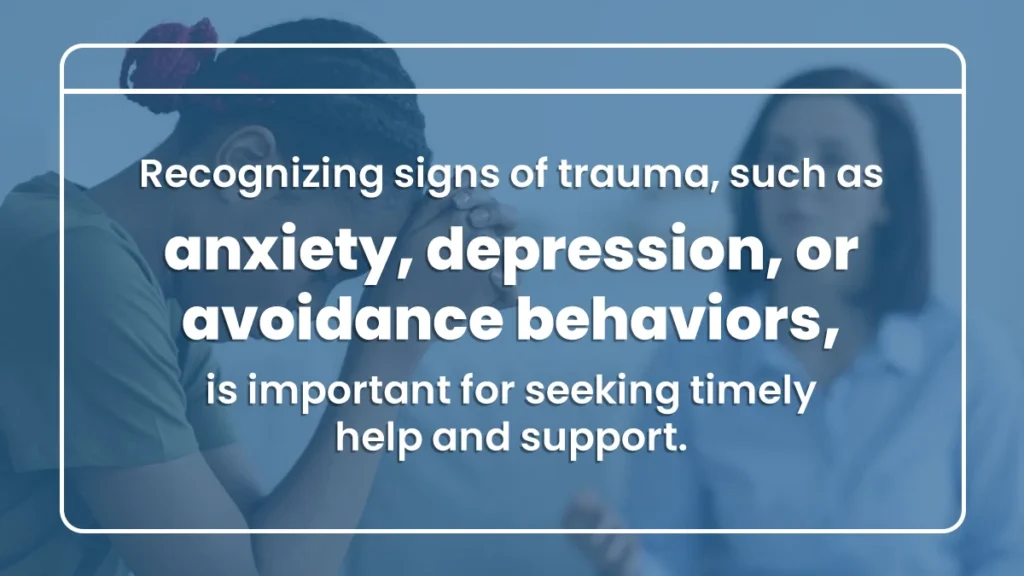Emotional trauma, a distressing experience that can affect anyone, leaves a profound impact on adults. Trauma stems from events like accidents, abuse, or loss, overwhelming the mind’s coping mechanisms.
Its effects linger, manifesting as persistent emotional distress, and can disrupt daily life. Adults facing trauma may encounter symptoms such as anxiety, depression, and flashbacks, affecting their relationships and overall well-being.
It is important to comprehend these warning signs to get the necessary support and recover. Through this article, we aim to examine emotional trauma and its effects on adults, intending to offer knowledge on how to identify and address these issues.
Key Takeaways
Emotional trauma, caused by events like accidents, abuse, or loss, can overwhelm the mind’s coping mechanisms in adults. Here is what you need to know:
- Emotional trauma in adults can manifest in diverse ways, affecting mental, emotional, and physical well-being.
- Recognizing signs of trauma, such as anxiety, depression, or avoidance behaviors, is important for seeking timely help and support.
- Effective therapeutic interventions, like EMDR and CBT, can help individuals process unresolved trauma and embark on a path to healing and recovery.
At The Haven Detox-New England, we provide healing and support. Contact us at (844) 933-4145 to embrace recovery.
Trauma: Understanding the Concept
Trauma is a psychological response to distressing events that exceed an individual’s ability to cope effectively. These events can take various forms, such as accidents, natural disasters, abuse, violence, or significant losses. Trauma care is crucial, as it can have enduring consequences on the mental and emotional well-being of adults.
When trauma occurs, the brain’s stress response system activates, releasing hormones like cortisol and adrenaline. This reaction prepares the body to face danger, leading to the “fight or flight” response. However, in traumatic situations, this response can become overwhelming, disrupting normal functioning.
Adults who have experienced trauma may exhibit a range of symptoms, including hypervigilance and emotional numbness. These symptoms can significantly impact their relationships, work, and overall quality of life.
It is crucial to recognize signs of trauma and seek help in different ways. In the US, many resources and professionals are available for lasting impact against emotional trauma.
Recognizing Signs of Emotional Trauma

Identifying emotional trauma in adults involves recognizing symptoms. Sign comprehension is critical for healing support.
Physical Signs
Emotional trauma can manifest through physical signs as well, impacting an individual’s overall well-being. Chronic pain, muscle tension, and headaches are common physical symptoms.
These manifestations result from the body’s prolonged state of heightened stress and tension due to the trauma. Sleep disturbances, like insomnia or recurring nightmares, also contribute to physical distress.
Furthermore, individuals may resort to unhealthy coping means, such as substance abuse or overconsumption, which can lead to weight fluctuations and other physical health issues.
Mental and Emotional Signs
Emotional trauma profoundly affects an individual’s mental and emotional well-being. Common signs include persistent anxiety, often characterized by excessive worry and restlessness, as well as overwhelming feelings of sadness and hopelessness, indicative of depression. A constant sense of unease is a frequent emotional manifestation.
Additionally, individuals may experience emotional numbness, a detachment from their feelings, or a sense of isolation from others. Guilt, shame, and self-blame can further intensify these emotions.
Social and Behavioral Signs
Emotional trauma often manifests through social and behavioral signs, which can disrupt an individual’s daily life and relationships. Adults affected by trauma may exhibit increased irritability, anger, or mood swings, making it challenging to maintain healthy interactions. They might withdraw from social activities, isolating themselves from friends and family.
Substance abuse, such as alcohol or drugs, could be used as a coping mechanism to numb emotional pain. Work or academic performance may decline due to difficulties with concentration and decision-making.
Common Symptoms of Emotional Trauma
Emotional trauma often leaves a lasting mark on individuals. The common symptoms are essential to understand for helping those affected on their path to healing and recovery.
Flashbacks and Nightmares
Flashbacks and nightmares are distressing and intrusive symptoms commonly associated with emotional trauma in adults. Flashbacks are vivid and painful recollections of traumatic events, making individuals feel like they are reliving the experience. These can be triggered by various stimuli, leading to intense emotional distress.
Nightmares, on the other hand, are unsettling dreams that often reenact the traumatic event, causing disrupted sleep patterns and heightened anxiety. Both flashbacks and nightmares contribute to a constant sense of fear and unease, making it challenging for individuals to cope with their trauma.
Emotional Detachment or Numbness
Emotional trauma usually leads to a sense of emotional detachment or numbness in adults. This manifestation of trauma can cause individuals to become disconnected from their feelings and those of others. They may find it challenging to express or experience joy, love, or even sadness.
This emotional numbing is a coping mechanism the mind employs to protect itself from the overwhelming distress associated with the traumatic event. It can result in strained relationships, as loved ones may perceive the affected individual as distant or unresponsive.
Difficulty Concentrating
Difficulty concentrating is a common cognitive symptom of emotional trauma in adults. The overwhelming impact of trauma can disrupt an individual’s ability to focus and maintain attention. They may find it challenging to complete tasks at work, school, or in daily life due to intrusive thoughts related to the traumatic event.
This difficulty concentrating can contribute to declining academic or work performance, increasing stress and frustration. It all underscores the profound cognitive impact of emotional trauma.
Avoidance Behaviors
Avoidance behaviors are common responses to emotional trauma in adults. These behaviors involve deliberately steering clear of situations, people, or places that trigger distressing memories or thoughts related to the traumatic event. For example, someone who experienced a car accident might avoid driving or even being near roads.
Avoidance behaviors can be an attempt to protect oneself from the emotional pain associated with trauma. However, while they may provide temporary relief, they often hinder the healing process by preventing individuals from processing and confronting their feelings.
Enduring Emotional Trauma: Triggering Factors
Emotional trauma can stem from various sources, often leaving individuals grappling with the enduring effects of distressing experiences. Here are three significant triggers of emotional trauma:
Childhood Abuse: Childhood abuse, whether physical, emotional, or sexual, is a potent source of emotional trauma. These early traumatic experiences can have profound and long-lasting effects, shaping an individual’s emotional and psychological well-being throughout their life. The impact of childhood abuse may lead to symptoms such as low self-esteem and difficulties in forming healthy relationships.
Traumatic Events in Adulthood: Traumatic events occurring in adulthood, such as accidents, natural disasters, violence, or assaults, can trigger emotional trauma. The sudden and overwhelming nature of these events can disrupt an individual’s sense of safety and control, leading to symptoms like flashbacks, miseries, and heightened anxiety.
Grief and Loss: Grief and loss, including the death of a loved one or the end of a significant relationship, can also trigger emotional trauma. The intense emotions, sense of emptiness, and profound sorrow associated with these experiences can lead to a person feeling exhausted.
Acknowledging the connection between past experiences and present emotional distress is essential for seeking appropriate support and therapeutic interventions.
Effect of Trauma on Mental Health
Trauma has an enduring impact on individuals, often leading to conditions like depression, anxiety, and post-traumatic stress disorder (PTSD).
Depression: It is a common consequence of emotional trauma, characterized by persistent feelings of hopelessness and a loss of interest in earlier enjoyable activities. Traumatic experiences can trigger or exacerbate depressive symptoms, leading to a sense of emptiness and worthlessness.
Anxiety: It is another prevalent outcome, with individuals experiencing excessive worry, restlessness, and heightened arousal. Trauma-induced stress can manifest as panic attacks, phobias, or generalized anxiety disorder, making it challenging for individuals to manage their daily lives.
Post-Traumatic Stress Disorder: PTSD is a specific condition linked to trauma, resulting in intrusive thoughts and terrors related to the traumatic event. Those with PTSD may also experience emotional numbness and hyperarousal, with triggers intensifying their distress.
Trauma survivors must realize their condition and seek appropriate support to address the complex challenges they may face on their journey toward recovery.
When To Seek Help for Emotional Trauma
Seeking help for emotional trauma is essential when its impact interferes with an individual’s daily life, relationships, or well-being. Signs that signal the need for assistance include persistent symptoms like anxiety, depression, flashbacks, nightmares, or emotional numbness. When avoidance behaviors hinder daily functioning or substance abuse emerges as a coping mechanism, it’s time to reach out for support.
Additionally, if the trauma triggers overwhelming distress or interferes with work, education, or social activities, seeking professional help is crucial. Timely intervention from therapists, counselors, or support groups can provide practical strategies for managing emotional trauma and fostering the healing process.
Frequently Asked Questions (FAQ)
How do you know if you’re emotionally traumatized?
The trauma that builds emotionally, often stemming from childhood experiences, manifests in various ways. It affects the brain and nervous system, triggering emotional reactions and symptoms of concussion. Individuals who have endured such experiences may display a range of lasting impacts, including anxiety, depression, and relationship problems.
The recognition of risk factors and seeking treatment is important, as therapy and support can help address the psychological trauma and mitigate its effects on the child and adult survivors. If you suspect you may be emotionally traumatized, it’s essential to reach out for help and healing.
What does unresolved trauma look like in adults?
Unresolved trauma in adults can manifest in various ways, with symptoms of trauma arising from different types of traumatic incidents such as sexual abuse or complex trauma. These symptoms include anxiety, depression, and relationship problems, often with lasting impacts.
In the short term, patients may exhibit emotional distress, while in the long span, complex trauma can result in more pervasive psychological challenges. Unresolved trauma can impair relationships, self-esteem, and overall quality of life.
Eye movement desensitization and reprocessing (EMDR) and cognitive behavioral therapy (CBT) offer practical tools for processing and addressing unresolved trauma.
The Haven Detox-New England: Trauma Survivor’s Refuge
Emotional trauma can profoundly impact adults, often leading to a range of challenges, including addiction. At The Haven Detox-New England, we understand the connection between trauma and addiction. Therefore, we are committed to providing you with an effective recovery through our services.
Our dual diagnosis program helps those whose trauma has led to substance abuse, providing integrated care for both conditions. With our detox services, we guide individuals towards a clean slate, while our residential treatment offers a nurturing atmosphere for lasting recovery.
Don’t wait any longer. Contact us at (844) 933-4145 today to begin your transformative journey from trauma.
Verify Insurance
Let’s get you or a loved one help with a few simple steps.
-
Mental Illness Treatment
- Am I Depressed? Coping with the Blues
- Anxiety Disorders: Exploring the Different Types
- Anxiety No More: Your Guide To Effective Treatment
- Anxious Minds: A Dive Into Different Anxiety Disorders
- Bipolar Disorder: Signs and Symptoms
- Bipolar II Disorder: Symptoms, Causes, and Treatments
- Blue Mood: A Closer Look at Depression
- Genes to Environment: Causes of Depression
- Healing Hearts: Approaches to Treating Depression
- Inside the Mind: Exploring the Depths of PTSD
- Navigating Emotional Trauma in Adulthood
- What is Bipolar I Disorder: Strategies for Stability




